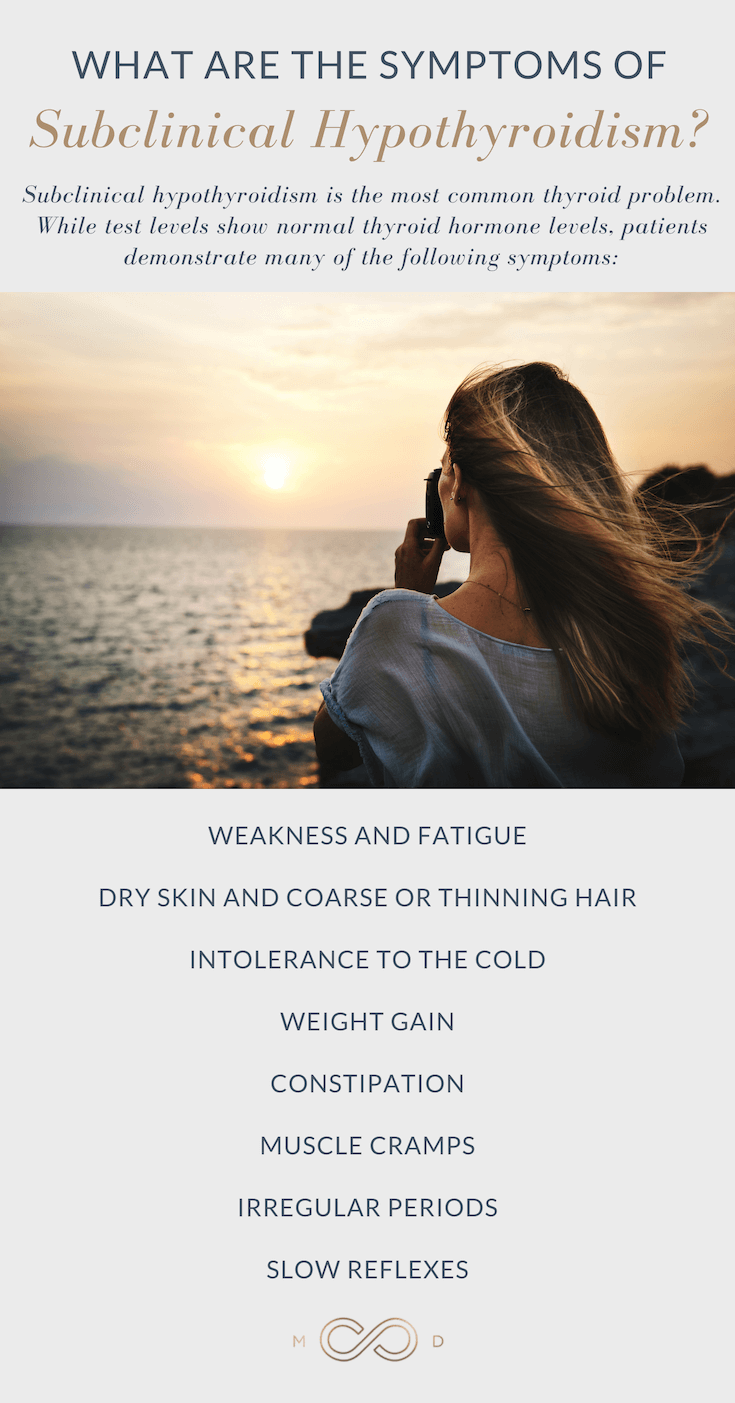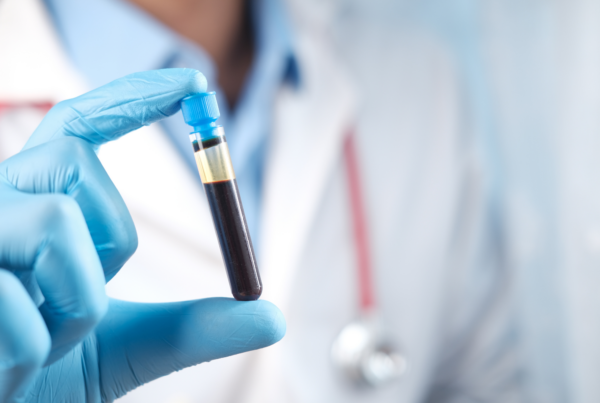You’re not just tired, you’re devoid of energy. You’re not just cranky, you’re unusually irritable and moody.
Perhaps your menstrual cycle resembles an unpredictable roller coaster, or your hair is thinning and falling out.
What could cause so many uncomfortable symptoms?
You might guess general aging or menopause, but believe it or not, your thyroid could be to blame.
Women are 10 times more likely to experience a thyroid imbalance than men. Could you be one of the millions of women with a hidden thyroid problem?
What Is Your Thyroid?
Just like a car needs an engine to produce its energy, your body needs its thyroid gland for the same reason.
This butterfly-shaped gland sits at the base of the neck but shouldn’t be visible or easily detected. And even though it’s small in size, the thyroid plays an enormous role in the body that can’t be understated.
How Does Your Thyroid Work?
Your thyroid doesn’t function alone. It shares a complex interdependence with the bloodstream and brain in order to produce and release thyroid hormones into your body. These hormones provide the energy your body needs to perform essential functions.
As the engine of your body, the thyroid needs fuel. Iodine found in table salt, seafood, bread, and milk functions as that fuel. Your thyroid identifies iodine in your bloodstream and extracts it to synthesize thyroid hormones called T4 and T3.
The pituitary gland in the brain works with the thyroid “engine” and iodine “fuel” to accelerate or slow the production of thyroid hormones. You can imagine the pituitary gland as the control room that sends messages to the thyroid gland and decides what quantity of thyroid hormones should be produced.
The messages from the pituitary gland to the thyroid gland come in the form of thyroid-stimulating hormones (TSH). Based on TSH levels, your thyroid knows whether to produce more or less of its hormones to meet the body’s needs.
How Is the Thyroid Connected to the Rest of the Body?
This precise thyroid-iodine-pituitary system influences the whole body’s health. Here are just a few of the dozens of functions regulated by a healthy thyroid:
- Metabolic rate
- Heart function
- Digestive function
- Muscle control
- Brain development
- Mood
- Menstrual cycles
- Body temperature
- Blood sugar
A healthy thyroid maintains just the right levels of its hormones, which helps your body achieve optimal functionality and health.
Why Is the Thyroid So Misunderstood?
Although it’s vital to the body, the thyroid is also widely misunderstood. Since the thyroid is involved in dozens of critical human processes and biochemical reactions, it isn’t always immediately clear that specific symptoms connect back to the thyroid.
For example, thinning hair, irritability, and weight loss are all signs of thyroid problems, but they can also signify numerous other conditions like menopause.
When I was an intern in residency, one of my first attendings described the thyroid as the Great Masquerader, and he was absolutely correct!
The symptoms that indicate thyroid problems are rarely identified immediately as relating to the thyroid.
All of this is exacerbated by the fact that most patients get less than ten minutes to visit with their primary doctors each year.
Regular doctors are under so much pressure to move quickly from patient to patient that they can’t stop to listen, carefully assess symptoms, and compare lab tests to uncover the truth.
What Is Subclinical Hypothyroidism?
Subclinical hypothyroidism poses yet another challenge to the diagnosis of thyroid problems. This term refers to a subtle thyroid imbalance that many doctors miss in their rush to move to the next patient.
Women with subclinical hypothyroidism often complain of common hypothyroidism symptoms like thinning hair, irregular menstruation, irritability, and fatigue, yet basic thyroid screenings show normal levels of thyroid hormones.
These women get lost in the “middle” between patients with overt thyroid disorders, forcing them to suffer without an official diagnosis or professional treatment.
The Major Risks of Untreated Subclinical Hypothyroidism
Untreated subclinical hypothyroidism poses major threats to the body, including threats you may not expect.
Research indicates that more than 25% of adults with subclinical hypothyroidism will develop full-blown hypothyroidism within six years, but this isn’t the only way that subclinical hypothyroidism makes the body vulnerable to health problems that increase cardiovascular risk factors.
High Cholesterol
Cholesterol synthesis is one of the most complex biochemical and energy-rich processes that the human body performs. The production of every single molecule of cholesterol requires 20 chemical reactions!
When the thyroid becomes imbalanced and doesn’t perform properly, it decreases the function of the enzyme that controls cholesterol synthesis.

Instead of reducing cholesterol levels in the body, this actually increases the amount of cholesterol in the bloodstream because it decreases the receptors in the liver responsible for filtering bad LDL cholesterol out of the body.
Adults who live for many years with subclinical hypothyroidism are extremely vulnerable to high cholesterol and, as a result, heart disease. This vulnerability also correlates to lipoprotein(a), an emerging marker for cardiovascular disease risk.
Bob Harper, the widely respected celebrity fitness trainer and coach on “The Biggest Loser”, recently shared his story of nearly losing his life as a result of high lipoprotein(a) levels.
He collapsed during a workout at the gym and suffered a massive cardiac arrest, leaving he and his doctors baffled. How can a fit, active man in excellent health nearly drop dead from a heart attack without any warning signs?
Lipoprotein(a) was the culprit.
It’s a fatty particle in the blood, just like the HDL and LDL cholesterol that doctors routinely measure, but research now indicates that high levels of lp(a) triple the risk of heart attack or stroke at an early age by accelerating the formation of plaque in the arteries.
Any adult with high lp(a) levels and subclinical hypothyroidism could be facing imminent cardiovascular danger.
Insulin Resistance
Subclinical hypothyroidism is also linked to insulin resistance, which in turn affects cardiovascular health.
Your body normalizes blood sugar by producing insulin in the pancreas and releasing the insulin whenever blood sugar becomes elevated. This critical process prevents sugars from accumulating in the blood and causing a range of health problems.
However, subclinical hypothyroidism makes it more likely for your body to start ignoring insulin and develop a resistance to its effects. Many people with subclinical hypothyroidism become insulin resistant and suffer an invisible and silent but deadly inflammation process. This leads to diabetes, heart attacks, stroke, and even cancer.
Reduced Fat Metabolism
Subclinical thyroid also impacts your body’s fat metabolism process and causes weight gain and fat accumulation. Excess fat harms the body by increasing the risk of heart disease, diabetes, stroke, and high blood pressure.
If you take a look at the big picture, the thyroid doesn’t function in a vacuum. Far from it! The thyroid affects so many core body processes that it may be directly responsible for the health issues you currently face.
Even if you don’t have overt hypothyroidism, it’s still possible that your thyroid’s subtle imbalances are wreaking havoc inside your body.
Common Thyroid Problems and Their Complications
Thyroid problems can manifest themselves a few different ways in the body. Each thyroid problem presents unique complications and risk factors.
Graves’ Disease
Graves’ disease is an autoimmune disease. It develops when the body’s immune system produces antibodies that override the normal regulation of the thyroid and cause overproduction of the thyroid hormone.
Bulging eyes, fatigue, irregular heartbeat, anxiety, and heat sensitivity are a few of the symptoms that occur with Grave’s disease. It can be treated using methods that inhibit production of thyroid hormones like radioactive iodine therapy and anti-thyroid medications.
Hashimoto’s Thyroiditis
Hashimoto’s disease also occurs as a result of the body’s immune system attacking the thyroid. The inflammation triggered through Hashimoto’s disease causes the thyroid to underperform and present typical hypothyroidism symptoms like fatigue, increased sensitivity to cold, hair loss, and unexplained weight gain.
Synthetic hormone replacement therapy has the potential to reverse Hashimoto’s disease, but symptoms often persist even with treatment.
Subclinical Hypothyroidism
As discussed above, subclinical hypothyroidism is the most common thyroid problem. Middle-aged women are especially vulnerable to subclinical hypothyroidism. Their test levels show normal thyroid hormone levels, yet they demonstrate many of the following symptoms:
- Weakness and fatigue
- Dry skin and coarse or thinning hair
- Intolerance to the cold
- Weight gain
- Constipation
- Muscle cramps
- Irregular periods
- Slow reflexes
Though traditional doctors are likely to overlook subclinical hypothyroidism, a concierge doctor knows how to recognize the signs of this condition and complete the thorough, comprehensive analysis needed to properly diagnose hypothyroidism.
The Best Ways to Keep You Thyroid Healthy
You can’t see or feel your thyroid, so you might wonder how you can possibly protect it and keep it healthy. There are actually many simple strategies known to lower your risk of thyroid complications, all of which also contribute to improved overall health.
Avoid Unnecessary Radiation
Radiation is a necessary evil in modern medicine, especially cancer treatment. This is why cancer survivors who received radiation treatment have a higher risk of primary hypothyroidism, thyroid nodules, and thyroid cancer.
Excessive medical tests like CAT scans and MRIs can also lead to thyroid issues. One simple CAT scan is equivalent to 200 chest x-rays! One of the easiest ways to protect your thyroid health is to avoid unnecessary radiation. Opt for alternative testing when possible.

Maintain a Healthy Weight
It’s a common misconception that an underperforming thyroid causes weight gain, but the truth is that most people develop an underperforming thyroid because of their extra weight.
Too much excess fat inhibits the conversion of the thyroid hormone into its active form, and as a result thyroid function diminishes.
Treatment Options for Thyroid Problems
Living with the symptoms and complications of a thyroid problem can be devastating. From fatigue and weight gain to irregular heartbeat and cardiovascular disease, the issues that develop as a result of thyroid problems can sideline you from your favorite activities and restrict your quality of life.
There are many treatments available for thyroid problems, but it’s critical to educate yourself about your options and find a doctor who shares your healthcare values.
The Major Problems With Traditional Thyroid Treatments
Thyroid screening is used to inform subclinical hypothyroidism treatment, and most traditional doctors approach thyroid screening the same way — by measuring the level of thyroid stimulating hormone (TSH) in your blood. TSH is a hormone released by the pituitary gland to regulate the production of thyroid hormone.
When the amount of thyroid hormones in your system dips, TSH increases to secrete more thyroid hormone and stimulate thyroid function.
On the flip side, when thyroid hormone becomes too high, TSH is supposed to secrete less thyroid hormone to achieve balance. This is known as a positive-negative feedback loop.
Traditional doctors evaluate levels of TSH to make a black-and-white evaluation. If TSH is low or normal, they assume the thyroid is functioning normally. If TSH is high, they assume the thyroid is underperforming. However, this simplistic diagnostic tool has major flaws.
First, the body actually has two forms of thyroid hormone floating around, yet standard thyroid screening only tests for the inactive version (T4).
A full 90% of the body’s thyroid hormones are inactive and bound to proteins floating through the blood and wait to be converted into the active form. T4 hormones send signals to your brain to either stimulate or suppress TSH. Meanwhile, the active version of the thyroid hormone (T3) isn’t tested at all.
As a result, doctors tend to prescribe Synthroid for subclinical hypothyroidism treatment. However, this only replaces the inactive (T4) hormone.
If excess weight or other health problems prevent the periphery from converting inactive thyroid hormone (T4) into active thyroid hormone (T3), then Synthroid doesn’t improve the condition at all.
Why Is Natural Hormone Therapy Better Than Synthetic?
As much as pharmaceutical drugs are designed to help people, they are also designed to make a profit. Unfortunately, some of the best treatment solutions cannot be patented, such as natural thyroid hormones.
Since they can’t be patented and can’t make a profit, pharmaceutical companies aren’t interested in them and they can’t receive regulation by the FDA.
This is why many doctors prefer to use synthetic hormones — they have the oversight and approval of the FDA. However, natural and concierge doctors identify the benefits of natural hormone therapy even without FDA approval.
Since natural bioidentical thyroid hormones are derived from real porcine thyroids, natural thyroid hormone therapy infuses the body with T4 and T3 hormones.
This is exactly why I don’t have a single one of my thyroid patients on Synthroid.
I use only natural bioidentical thyroid hormones like Naturethroid and Armorthryoid, and my patients feel and function dramatically better.
They no longer exhibit subclinical hypothyroidism symptoms, and they can embrace a full and rewarding life without the threat of subclinical hypothyroidism complications and risks!
When To Treat Subclinical Hypothyroidism
Due to the complications associated with subclinical hypothyroidism, timely treatment is essential. If you believe you’re experiencing any of the symptoms described above, it’s time to diagnose and treat your condition.
How to Find a Great Thyroid Doctor Near Me
Not every doctor has the experience and knowledge needed to effectively treat your thyroid condition. In order to find a thyroid doctor near you, first search for an expert in bioidentical hormones.
You could do this online or through a discussion with your primary care doctor. In preliminary conversations with any potential thyroid doctor, inquire about their beliefs on using natural thyroid hormones compared to Synthroid.
Make sure you choose a doctor whose beliefs and practices align with your medical wishes and goals.
At Brentwood MD, we are completely committed to listening to you as a patient and becoming your partner on your journey to better health.
We evaluates all conditions from a true holistic standpoint to ensure that no health issue is overlooked. Whether your thyroid affects your blood sugars, your sex life, your sleep, or anything in between, we will identify the problem and help you implement natural and effective treatments to improve your wellness.

Dr. Aaron Wenzel is a concierge physician specializing in the care of fast-moving entrepreneurs, executives, and public figures in the Nashville, TN area. Dr. Wenzel’s diverse life experience and extensive training in family medicine, emergency care, nutrition, and hormone replacement therapies give him the unique platform to provide unmatched care for his patients.







